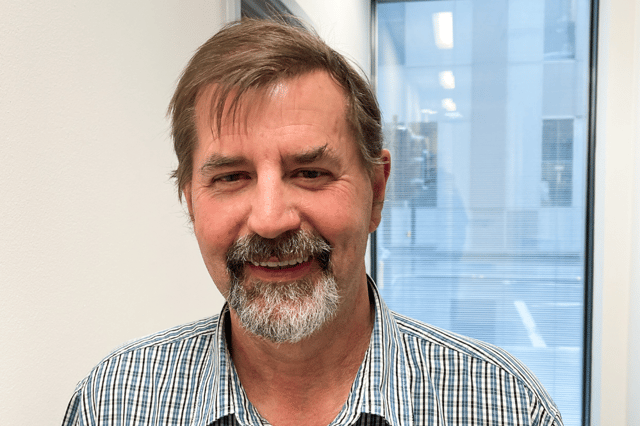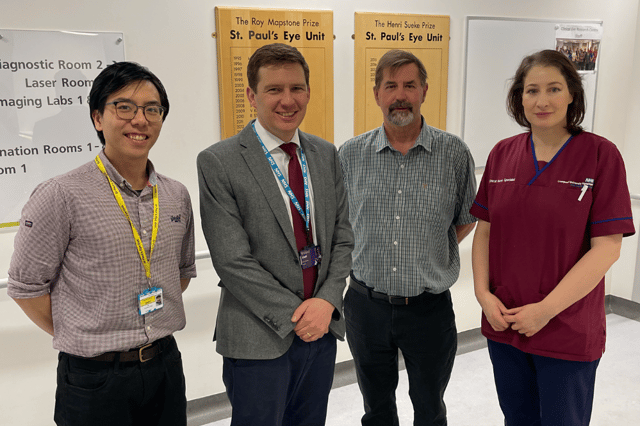I feared I wouldn't see my grandchildren grow up so signed up to be world’s first patient to try new treatment
and live on Freeview channel 276
A grandad from Bootle has become the first person in the world to be given a new medication that could change his life, after fearing he would not see his grandchildren grow up.
Steve Gotts, 63, has lived with diabetes for over 30 years and though his condition is currently under control, the retired scientific officer knew that possible future complications could include him losing his sight.
Advertisement
Hide AdAdvertisement
Hide AdIn the UK, nearly all patients diagnosed with Type 1 diabetes and almost two thirds of patients with Type 2 diabetes have signs of damage to the back of the eye within 20 years of diagnosis - known as diabetic maculopathy. Caused by a build-up of excess fluid in the back of the eye, the condition leaves patients at risk of losing eyesight, causing devastating effects to everyday life.
A keen golfer and a fan of building complex scale model figurines, Steve decided to participate in a new clinical trial with Liverpool University Hospitals NHS Foundation Trust. Discussing the treatment, Steve said: “I’ve been struggling to manage my diabetes for a long time and the team at the hospital have helped me control my symptoms. However, looking to the future, the prospect of going blind due to my condition and not seeing my grandchildren grow-up made me want to take part in a clinical trial.”


The first of 24 people across the world to be given a dose of a new tablet-based medication - Danegaptide - aiming reduce the effects of diabetic maculopathy. Steve said ‘the opportunity to join the trial came at the perfect moment’. He explained: “Not only was it available to me, based on the stage of my condition, but it is also available in my hometown of Liverpool. I am proud to be the first patient in the world to try this treatment, which will hopefully not only help save my sight, but other’s sight as well.”
Currently, diabetic maculopathy can only be treated at an advanced stage with injections or a laser to the back of the eye. However, the new treatment is hoping to prevent or prolong deterioration all together, and stop people becoming blind. St Paul’s Eye Research Centre (CERC), located at the Royal Liverpool University Hospital, and the University of Liverpool, partnered with Breye Therapeutics to deliver the first dose of a treatment. The medication will now be taken for a month and patients will be closely monitored by clinical teams.
Advertisement
Hide AdAdvertisement
Hide AdSteve said: “Receiving the treatment was seamless. The unit and the research staff supporting me were lovely and have continued to monitor me at weekly appointments over four weeks.
“It’s been a great experience. The treatment options currently available to diabetic patients are very invasive so I am glad I can play my part in hopefully replacing this with much gentler treatment and benefit from the treatment myself.”


Dr Phil Burgess, Honorary Consultant Ophthalmologist at Liverpool University Hospitals and Clinical Senior Lecturer at the University of Liverpool, said: “We are so proud to be the first clinical team in the world to administer this new treatment for diabetic maculopathy and bring this study to our patients here in Liverpool and beyond. This new drug could mean that injections into the back of the eye may not be necessary for patients suffering with this condition, instead replacing this with a tablet-based treatment - which is a much more comfortable treatment for patients.
“As a team, we are elated that we can bring such cutting-edge research to our patients through the hard work and dedication of the research staff at St Paul’s CERC. We look forward to seeing the results of the next phase of this clinical trial.”
Advertisement
Hide AdAdvertisement
Hide AdIf you or someone you know is currently dealing with the effects of diabetes, contact your GP. You can also visit the NHS website, which explains these symptoms and when to get checked in more detail. More information about how you could get involved in research at Liverpool University Hospitals is able here.
Comment Guidelines
National World encourages reader discussion on our stories. User feedback, insights and back-and-forth exchanges add a rich layer of context to reporting. Please review our Community Guidelines before commenting.